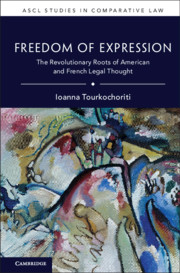Book contents
- Freedom of Expression
- ASCL Studies in Comparative Law
- Freedom of Expression
- Copyright page
- Contents
- Acknowledgments
- 1 Introduction
- 2 Antiquity, Modernity, and Historical Imaginaries on the Role of the Government
- 3 The Underlying Ex Ante Understanding of Liberty
- 4 The Moralizing Rational Republic versus the State Arbitrator of the Free Play of Interests
- 5 Foundation of the Rights of Man on the Rights of the Citizen versus Foundation of the Rights of the Citizen on the Rights of Man
- 6 Conclusion
- Bibliography
- Index
4 - The Moralizing Rational Republic versus the State Arbitrator of the Free Play of Interests
Published online by Cambridge University Press: 29 October 2021
- Freedom of Expression
- ASCL Studies in Comparative Law
- Freedom of Expression
- Copyright page
- Contents
- Acknowledgments
- 1 Introduction
- 2 Antiquity, Modernity, and Historical Imaginaries on the Role of the Government
- 3 The Underlying Ex Ante Understanding of Liberty
- 4 The Moralizing Rational Republic versus the State Arbitrator of the Free Play of Interests
- 5 Foundation of the Rights of Man on the Rights of the Citizen versus Foundation of the Rights of the Citizen on the Rights of Man
- 6 Conclusion
- Bibliography
- Index
Summary
The conception of the state as having the mission to accomplish the role of regenerating citizens was omnipresent among the actors of the French Revolution, in particular the Jacobins. Elements from this vision inspired by Rousseau permeated the understanding of the role of the government in France, and is present even today. This conception leads to state paternalism. The state will define the opinionst that are worthy of being heard and those that are harmful. The political needs to which the Americans were confronted found their expression in the optimism of Locke and the Scottish Enlightenment. These thinkers express trust in the self-regulating potential of civil society. This conception would legitimize minimal impact of the political order upon the social. The political order and, by extension, the legal order, would be limited to arbitrating the differences that emerge within civil society. These ideas can constitute the prism through which the American conception of freedom of expression can be understood. Today, this conception means minimal regulation of speech by the government. Political correctness is a mode of self-regulation in the spirit of Smith’s thought.
- Type
- Chapter
- Information
- Freedom of ExpressionThe Revolutionary Roots of American and French Legal Thought, pp. 140 - 197Publisher: Cambridge University PressPrint publication year: 2021

